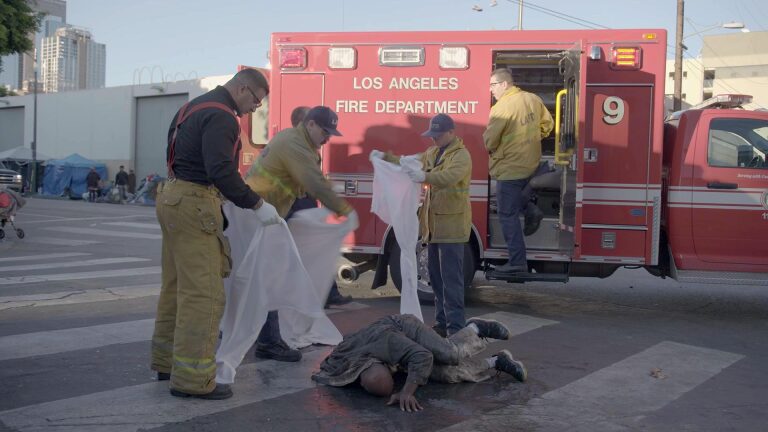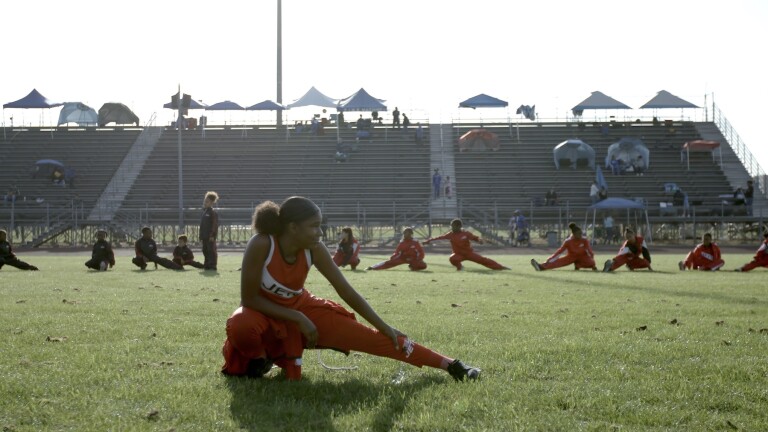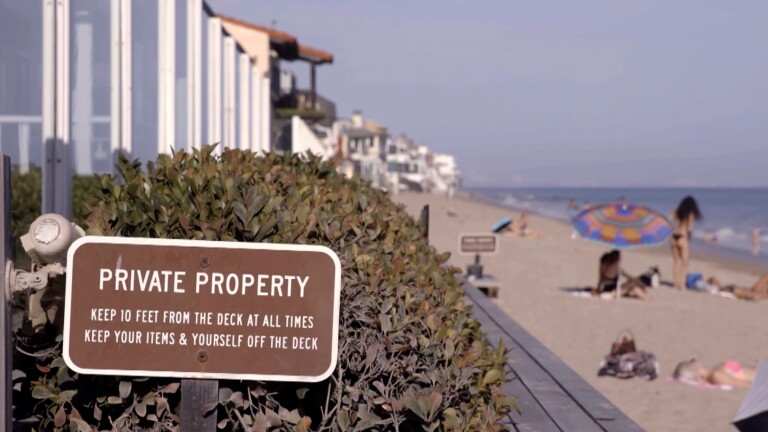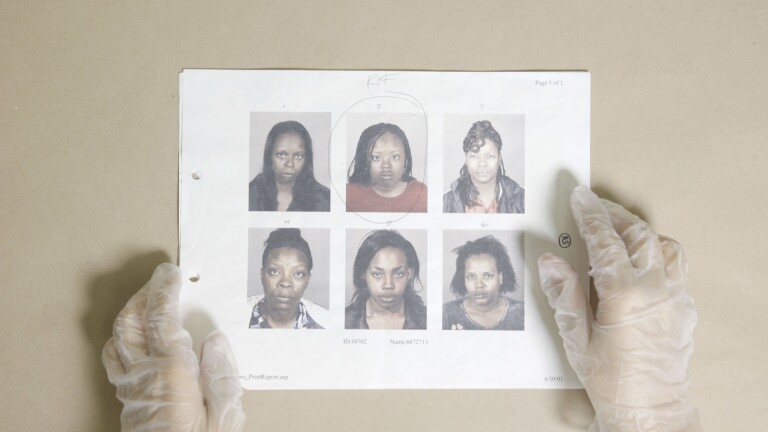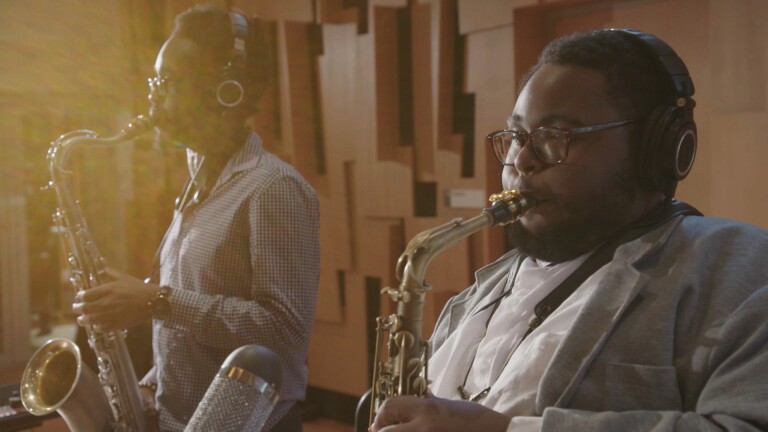
Life After Being Wrongfully Imprisoned
*Update: Obie Anthony received full compensation July 2016. Rafael Madrigal was turned down by the compensation board and has appealed his case. He is currently waiting to hear back to see if his request will be upheld or denied.
"SoCal Connected" tells the moving stories of two innocent men who spent years behind bars for murders they did not commit, and their attempt to receive compensation for their time in prison. Obie Anthony spent 17 years in prison. Rafael Madrigal spent nearly a decade behind bars. It took years of legal work to overturn their convictions. Exonerees are then entitled to $140 for every day spent in state prison. But as "SoCal Connected" discovered exonerees must go through another ordeal to win compensation. The claim process is complex and exacting, and may or may not end in success. "SoCal Connected" reporter Alex Stapleton looks at the financial struggles and emotional toll that an innocent father and exonerated husband endured in their attempt to win compensation for lost years in prison.
Quick Links:
Paying for Years Lost Behind Bars
Transcript
Alex Stapleton: He was a young kid from a rough neighborhood in South L.A. His nightmare began at age 19.
Obie Anthony: They charged me with murders. Three attempted murders. Three attempted robberies. With special circumstances. I was like…do you got the right person?
Alex Stapleton: For Obie Anthony the stars aligned in a cruel constellation. He, like hundreds of others, was wrongfully convicted…of murder.
Obie Anthony: They had no physical evidence. They had no fingerprints…footprints. They didn’t match mine.
Alex Stapleton: Another one of the wrongfully convicted was Rafael Madrigal. At 25, he had just moved away from East L.A. and was working in a factory. It was a mistaken timecard that would help convict him of murder.
Rafael Madrigal: Your sentencing is 53 years to life. You get shipped out to a prison that's about 6 hours away now literally your life got taken away from you.
Alex Stapleton: But this isn’t just the story of how two innocent men were sent to prison It’s the story about how difficult it is to rebuild lives after being free. And how hard it can be to win compensation for their lost years behind bars.
Rafael Madrigal: Is anybody ever going to say we're sorry is anybody ever gonna be able to step up to the plate and say you know we made a mistake the sad part about it to this day, nobody has.
Chapter 2:
Alex Stapleton: I met Obie Anthony in South Los Angeles. The last place he was free before his arrest.
Alex Stapleton: This is where you grew up.
Obie Anthony: This is where I grew up. This is like, this is like, this is home.
Alex Stapleton: What does it feel like to be here now?
Obie Anthony: It's emotional. It's like a little overwhelming. ‘Cause again all around here. I grew up all around here. Like, almost anybody that I bump into around here may remember me from those times. Man, my mom died in here (crying). My dad died here, it's crazy like. I was an uneducated, black youth...
Alex Stapleton: From a neighborhood...
Obie Anthony: From a neighborhood that was 1.) riddled with drugs, homelessness, gang activity, all kinds of things, bad education system, all of these things.
Alex Stapleton: In 1994, on this street, a gang member was killed in a drive-by shooting. A witness identified Obie as one of the killers. The witness was a pimp who claimed to have seen the shooting.
Obie Anthony: I knew that he was lying ‘cause I knew that I was not there. I don’t know him. So I knew that he was lying but to prove those things was a different question.
Alex Stapleton: Obie was nowhere near the killing. And there was no DNA evidence to connect him to the murder. Still the unthinkable happened.
Obie Anthony: They fed him information. They kept information away from us. And they used him to perpetuate their ends which was to place me in prison.
Alex Stapleton: Obie was found guilty. He came here to Corcoran prison to begin a life sentence.
Obie Anthony: My mom had just passed away, and the only rock I had to keep me grounded was gone. So I was lost. I was really lost. But, I knew that I couldn't give up …how you say, lost in that loss because I was in jail now.
Alex Stapleton: Obie had been languishing in prison for six years when a letter arrived. An attorney had found evidence that the pimp who identified Obie had not actually seen any of the suspects. But he lied to get a lighter sentence on the pimping charge. It was a turning point.
Obie Anthony: And that there opened the door for the Northern Innocence Project and Loyola Marymount Project for the Innocent to get a hold of my case.
Alex Stapleton: How did it feel when you knew you had people on the outside helping you, that we're changing things for you, did you not want to get your hopes up?
Obie Anthony: Nah, I was, I started giving stuff away! I knew that was it! I was, I knew my creator, and I knew because he said the innocent will be vindicated.
Alex Stapleton: While the appeals process ground on, Obie got a visit from a childhood friend. Her name was Denise and their meeting would change their lives.
Denise: Oh the first time I seen him it was thru a glass and when i looked at him I was like (laughs) oh my goodness because initially I was gonna hook him up with my friend because I was going to see my brother and I wanted my friend to actually call Obie so he could have somebody and be out on a visit every week. Well it kind of turned around and I wanted to see Obie and that's what happened I started seeing Obie and
Alex Stapleton: You decided to keep him for yourself?
Denise: Yeah
Alex Stapleton: Denise stuck by Obie through his 14th, 15th, 16th year in prison. Finally after years of legal work, they presented their evidence to a judge. Evidence that could make Obie a free man. It all came down to the judge’s ruling.
Obie Anthony: He starts saying things and I was like, that is like, man before he even said that I was innocent and that I was coming home, that the charges would be dropped, I had already known and I was sitting there just thinking 'say it, say it, say it, say it' and when he finally said it I was like "yes"
Denise Anthony: That was an exciting day. That was an exciting day. I had been waiting on that since day one from 2008 ‘til 2011. I was excited he was excited it was just I was ready to start my life with him.
Alex Stapleton: His last hours behind bars were spent here at LA County Jail. His life as a free man started when he walked thru these doors.
Obie Anthony: This is where it started for me this is where my new life actually begun walking out of these doors right here into these arms right here. It was like wow, it was like dang man, this is over. Ahh, I couldn't wait and then there was a lot of people that was already here and it was like talk to the reporters a little bit. Walking through them doors is the beginning of me and who I am today. First thing I did was I went up to that room, it was a room we had, we got a hotel room right next too, close to jail, uh I got a room, took a hot shower and dove into the soft bed, and then we ate some chicken, some teriyaki chicken or something like that. It was good, ah.
Alex Stapleton: Obie Anthony was exonerated. He had a clean record and devoted wife. He had also lost more than 17 years of his life.
Obie Anthony: They can never compensate me for 17 years I still don't got kids. There's a lot of stuff that I am now just able to do, because they took it from me.
Chapter 3
Alex Stapleton: 50 miles east of Los Angeles another young man was about to be snared in the justice system. The year was 2000. Rafael Madrigal, Jr. was 25.
Rafael Madrigal: A typical day for me, let's see maybe a Monday or a Tuesday, getting up at 5 o'clock in the morning, taking my wife to work, coming back home, getting ready, going to work, getting off 3:30, 4:30 depending on how much work we had for the day, coming home at the time we only had 2 boys my two oldest, so you know spending the rest of the afternoon with them.
Alex Stapleton: Rafael and Veronica were high school sweethearts in East LA. Rafael was involved with gangs. But after graduating he and Veronica got married and moved to Riverside County and left the gang life behind.
Veronica Madrigal: Honestly, I didn't think... they would tell us you guys aren't going to make it. Who makes it at you know being a teenager, but here we are.
Alex Stapleton: But on a summer day in 2000 the life they were building fell apart.
Rafael Madrigal: We lived in a cul de sac, right before I drove into the cul de sac I noticed there was several sheriff deputies um…parked on the side of the street not directly in front of my house but about two blocks away. First thing that came to my mind was wow they're gonna give somebody a rude awakening early in the morning ‘cause it was only 6 o'clock in the morning. Never did it cross my mind that they were actually going to my house
Alex Stapleton: Sheriff’s deputies were there to take Rafael in for questioning. The crime? A drive-by shooting that happened the night before 45 miles away in East L.A. A Latino gang member was shot and killed by a rival gang. Rafael was a suspect.
Veronica Madrigal: I think I was angry. I was frustrated. I was scared. And it was a bunch of emotions that I felt.
Alex Stapleton: No DNA evidence tied Rafael to the crime. But a witness ID’d Rafael, an ID based a 10 year-old photograph from his gang days. On the day of the crime Rafael was at his job working for a packaging company. But court documents show he couldn’t prove it because of a mistake on this time card. The jury found Rafael guilty. His sentence: 53 years to life.
Rafael Madrigal: I think the verdict when the guilty verdict came in it felt just as bad as when I got arrested but now you're hearing it you're seeing it in front of you and your family's behind you seeing it and hearing it also so it’s like literally your world got taken away from you.
Alex Stapleton: Rafael spent year after year in prison while his children grew up and his wife struggled to support them. He missed the birth of his third child, Kimberly. The first time he saw here was when she visited him in prison.
Veronica Madrigal: The first time contact visit that she was able to have communication and hold and hug him it was not what we expected. The minute she seen him her eyes lit up like stars. They lit up, but as soon as he tried to hold her she freaked out. It was different seeing him from a glass window then seeing him personal and being able to touch him. She didn't have that type of bond with him. It was hard and I had seen it in him too because the minute he got her she was crying and I could see his demeanor just fall. His face just become sad. I told him you just got to give her chance, it's not easy, it's one thing to see you through a glass and the other one is being able to hold you. She doesn't know you like that.
Alex Stapleton: It was Rafael’s 8th year behind bars when a letter arrived. The attorney, who was working on his appeal, took a closer look at the evidence against him. That triggered a series of events led to the breakthrough Rafael had been waiting for. The manager at his workplace affirmed that Rafael had to have been at work the time of the murder. The Innocence Project would take his case.
Rafael Madrigal: I was never discouraged. I never lost hope that's the one thing i could honestly say I never lost hope.
Alex Stapleton: Then, another break. A fellow inmate convicted of the same murder, made a call from prison. It was recorded. In the conversation he said Rafael was not involved in the killing. These two pieces of crucial evidence convinced a judge overturned Rafael’s conviction.
Veronica Madrigal: I did believe in his innocence from the beginning. I just said if you're innocent you're going to come out, you know? I believed him.
Alex Stapleton: In the fall of 2009 after nearly ten years of incarceration Rafael walked out of Chino State Penitentiary -- exonerated.
Rafael Madrigal: There was a lot of cameras but to me the cameras blocked out my focus was to see my kids my family my wife my mom.
Alex Stapleton: I asked him what the best part of that day was.
Rafael Madrigal: Hugging my kids, hugging my kids they would visit me in prison but a hug in prison is not the same you're allowed a 30 second hug first time I was able to hold on to them for as long as I wanted to.
Alex Stapleton: He was home for good. But picking up where he left off almost a decade after seeing the police at his door would not be easy.
Chapter 4
Alex Stapleton: For the newly freed restarting life can be difficult.
Rafael Madrigal: I think one of the saddest parts about an exoneree. You get exonerated, they open the door, they show you the door and that's all you get.
Alex Stapleton: California is one of 30 states that offers some form compensation. An exoneree can apply for $140 for every day spent in state prison.
David McLane: What would you trade 20 years in prison for? Would you trade it for $500,000…$600,000.. which is what they are getting through this process.
Alex Stapleton: Civil rights attorney David McLane handled Obie Anthony’s compensation case.
David McLane: So when you weigh that, that they know that it doesn't fully compensate them you would think that they would try to ensure the process is as fair as possible.
Alex Stapleton: For Obie his claim comes to just over $580,000 dollars for 17 years in prison. For Rafael, it’s over $280,000 dollars for 9 years in prison. But payment is not guaranteed.
Wayne Strumpfer: You have to prove you’re innocent. But people have to prove their innocence and people have a hard time understanding that.
Alex Stapleton: Wayne Strumpfer is chief counsel for the board that reviews the claims.
Wayne Strumpfer: We're not saying hey, you don't deserve to get out of prison, we're saying hey, in order to get a hundred and forty dollars a day, to be compensated for actually being wrongfully convicted, you have to prove you were wrongfully convicted, not just that you got off on a technicality or the witness, or a juror made a mistake or made an attorney made a mistake but because you were actually innocent.
Alex Stapleton: Put another way: In a trial you are presumed innocent until proven guilty. But when in front of the compensation review board you are assumed ineligible until proven innocent.
David McLane: That they that they have to watch over taxpayers money. My response is .. they have gone overboard and they have created too high a bar and created too many procedural hurdles for people who are truly innocent.
Alex Stapleton: There is one thing that can virtually guarantee compensation. It’s called a finding of “factual innocence.” But the only way to get one is to present your case before a Superior Court judge. Obie was lucky. A judge issued a finding of “factual innocence.” He’s in line to receive compensation .. more than half a million dollars in June.
Alex Stapleton: Rafael was not as lucky. A judge was not fully convinced that the evidence proved “factual innocence.” Rafael’s claim for compensation? “Denied.”
Veronica Madrigal: It doesn't make any sense to me. It confuses me more. You're releasing him// but you're not compensating him even though his charges were you know overturned.// doesn't make any sense it doesn't make any sense whatsoever.
Alex Stapleton: Strumpfer says in the past only about a third of exonerees would get compensation. But that has number has improved.
Wayne Strumpfer: Now over the past year and a half our approval is 75 percent, 80 percent. So this change in the law that does streamline these cases that allows the defendant to get a finding of factual innocence, bring it to the Board, and say pay me, works.
Alex Stapleton: Despite the improvement the McLane still feels the review process is too tough.
David McLane: The system is kind of rigged against the defendants
Alex Stapleton: And for the exonerated it’s another emotional ordeal.
Chapter 5
Obie Anthony: “My name is Obie Anthony…”
Alex Stapleton: Obie Anthony has built a new life. He’s a vocal advocate for innocent people stuck behind bars. And he was struck by an additional injustice. Parolees who were guilty of a crime get help finding jobs and housing. Exonerees who never committed a crime got no help of any kind.
Obie Anthony: The system that falsely accused me, convicted me, incarcerated me took 17 years from me did zero did zero.
Alex Stapleton: He wanted to do something to change that. So in 2015 he went to Sacramento to testify before the State Assembly.
So I’m here today to ask for your “aye” vote in the support of the bill because of the tremendous amount of help that it would do.
Alex Stapleton: A law was passed. It was dubbed “Obie’s Law.” It requires the Department of Corrections to assist exonerees after they’re released. To help them rebuild their lives. To get simple things like a driver’s license.
Obie Anthony: Once they come home they will now receive a stipend of funds to help them to transition back into society and help them get their SSC identification card.
Alex Stapleton: But he hasn’t stopped there. Obie is taking another step. He is starting a non-profit organization called “Exoneration Nation.” Its mission will be to help exonerees like him get back on their feet.
Obie Anthony: The mission of the nonprofit is to not only assist exonerees when they come home to not only transition to a society but also to act as a nucleus to all the other centers that have been risen by exonerees across the united states to help them also facilitate help to those individuals who they are helping
Alex Stapleton: Exoneration Nation exists because of a multi-million dollar settlement from the city of Los Angeles. Obie Anthony was awarded $8.3 million for wrongful imprisonment. This award is separate from the state compensation he is still waiting for.
Obie Anthony: But when I won my civil complaint, and the city attorney acknowledged the fact that they was wrong, by way of rewarding me 8.3 million, you don't give a person 8.3 million dollars and say he did something. Nah (laughs) you just don't do that.
Alex Stapleton: He never thought he would end up as the founder and director of a non-profit organization.
Obie Anthony: But here I am I’m excited about it and I’m motivated to get these things not only completed but also to be successful and to help other individuals not be in the situation in other words what i was in when i came home.
Alex Stapleton: People in his old neighborhood in South LA are proud of him.
Alex Stapleton: Obie and Denise have made a new home in Missouri near Obie’s relatives.
Obie Anthony: So I defeated the monster that was after me and i get to come and stand here on a site and declare that victory and talk about that exoneration and talk about now how I’m gonna take that victory and move forward and help other individuals and do greater things.
Alex Stapleton: There is just one last thing he’s waiting for – a check from the State of California for $581,600 for 5,816 days in prison.
Chapter 6
Alex Stapleton: Rafael’s circumstances are very different than Obie’s. But six years after being release from prison he’s also rebuilding his life.
Rafael Madrigal: It takes on you is hard it's hard. You have those moments when you're enjoying your family but then there's those moments when you don't know how to react you don't know how to act you know you're used to being in an enclosed cell for 23 hours a day. Having people run around you and just have a normal day is not normal for you it was moments where I had to back up had to just sit myself in a room and just you know because it was hard.
Alex Stapleton: Without compensation the first challenge facing exonerees is financial. For Rafael it meant finding a job after nearly a decade out of the workforce.
Rafael Madrigal: In the years you lose a lot of experience and a lot of employers want to know your past employers or your past experience you have a ten year gap in your application they want to know what happened in those ten years. It's a question they have every right to ask but then when you explain yourself it's like okay.
Alex Stapleton: On his first job application, Rafael made a mistake.
Rafael Madrigal: They asked the question to prison or convicted of a felony. I had no idea that I was not no longer a convicted felon and there was no reason for me to put any of the information that happened prior to this but me being honest and trying to be as honest as I could with the application I explained my situation that had just happened to me on the day I was supposed to be hired I was actually fired because of me being in prison before.
Alex Stapleton: On his second application he did it right… and got the job. Today Rafael works six days week a manufacturing plant in Chino.
Rafael Madrigal: I love my job. I mean the company I work for the owner from the owner to the vice president to the janitor everybody is awesome there.
Alex Stapleton: And in 2010 something else even better came along.
Veronica Madrigal: Soon after I realized I got pregnant and I had my daughter Leslie she is now five. So it was like it was a gift.
Rafael Madrigal: I think she's, she's other than me coming home she is the biggest blessing you know she is the one that helped us all come back together. She was the bond.
Veronica Madrigal: I think our relationship has gotten much, much stronger and the kids too we are very open with them. as far as them with us so it is also it has been a journey. It hasn't been the easiest one.
Alex Stapleton: Rafael’s first claim for compensation was denied. But he’s appealing the decision. With four children…one in college…the money would make a big difference in their futures.
Rafael Madrigal: Will I ever get compensated? I think only the state knows. Am I gonna keep on fighting? Yes, I am. Why? Because I think that's gonna be the closure part that's gonna be, whether it's for good or for bad, it's gonna be the closure where i can finally put this behind me.
Alex Stapleton: What’s ahead is a life with his family. He is getting to know his oldest son Andrew who was only 6 when his father was imprisoned.
Andrew: What was the most challenging time. Seeing my mom struggle through it all.. put food on the table and to provide for us and care for our need.
Alex Stapleton: Andrew is now a student at Long Beach State … majoring in criminal justice.
Alex Stapleton: Does your father inspire you now after everything he’s been through?
Andrew: Yeah, it inspires me every day. That’s the whole reason I’m in college right now. I just want to put my time in in college and really demonstrate that everything that my family has been through has not been a waste.
Andrew: I’m just trying to get the rest of my family in a better place and I think we’ll get there. You know we’re all making strides and looking towards the positive even though there have been some negatives in the past but we’re all looking towards the future and hoping for the best.
Alex Stapleton: The best for the family would be winning the fight for compensation and putting this ordeal behind them.
Rafael Madrigal: Whether they grant it or not, only time will tell. But once that process is done, that's it I don't have to keep going back to a courtroom and explaining myself. I did not commit this crime. I do not have to go in front of people saying "You never proved yourself. How do we know you're innocent?" It puts all those doubters out of your way.
Related

